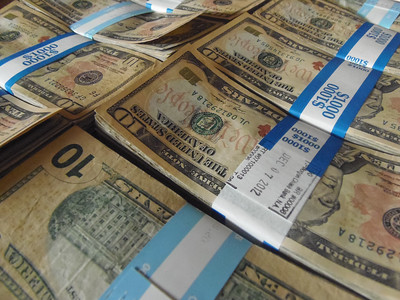
I recently heard a TED talk by Yuval Noah Harari, the historian and author who wrote “Sapiens.” I was struck by what he said. “If Humanity invests just an extra 2% of the global GDP in developing eco-friendly technologies and infrastructure every year, this would be enough to prevent catastrophic climate change, while also creating lots of new jobs and economic opportunities.”
It may be closer to 3%.
In 2022 the global GDP was $85.97 trillion, and 2% is $1.7 trillion. As Harari documents, we now spend over 2.4% of global GDP on the military annually; we subsidize fossil fuels to the tune of $500 billion a year; governments lose $427 billion in taxes each year due to corporations and wealthy individuals hiding funds in tax havens; and global food waste costs us 1% of global GDP a year.
As Reuter’s journalist Swathi Nair reported, investment in the green transition – 2-3% of global input annually until 2050 – is far less than the economic cost of inaction. Nair reminds us, “governments have spent a total of 10.2% of global output in response to the COVID pandemic.”
Reuters polled economists in Europe, Asia and the Americans. They found a strong agreement on the cost of delay: the longer we delay the higher the cost will be. While forecasters use different methodologies, the median view is we need to spend at least $44 trillion cumulatively over the next two or so decades. Some estimates are a third higher. James Nixon, head of climate change macroeconomics at Oxford Economics states that “While mitigation may be expensive and potentially politically painful, I think it’s incumbent on economists to show that not doing anything is even more expensive.” The economists state “the business-as-usual approach will reduce global output by at least $15-$16 trillion annually by the end of the century.” If we act now and jointly limit temperature rise, global output reduction will be minimal.
COVID caused the economy to shrink by 4.3% in its first year alone. “The economic impact of COVID has been significant but temporary. The GDP impacts of climate change, however, are permanent, long-term, and grow larger with each year of inaction,” said Claire Ibrahim, a director at Deloitte Access Economics.
So who should pay? The Guardian, in an article by Climate Justice Reporter Nina Lakhani, recently reviewed a groundbreaking analysis by One Earth that quantified the economic burden caused by individual fossil fuel companies. BP, Shell, ExxonMobil, Total (owned by the Saudis) and Chevron are among the 21 major polluters. You can read the full analysis in the journal One Earth. Overall, the study quantified economic damage alone at $99 trillion and attributed the actions of fossil fuel companies to $69.6 trillion. Economic damage and mitigation costs are not the same. “This is only the tip of the iceberg of long-term climate damages, mitigation and adaptation costs,” said co-author Richard Heede of the Climate Accountability Institute.
Thus far the question of who pays both for damages and mitigation has largely focused on the responsibility of nation states. This new study reframes the debate. It conservatively attributes only one third of future climate costs – damages and mitigation – to global fossil fuel industry and one third each to governments and consumers. While arguably it should be higher, that means the fossil fuel industry should cough up $893 billion in climate losses annually for the next 25 years.
And guess what – they can afford to pay their share. According to Lakhani, Saudi Aramco would owe $43 billion annually – about one quarter of their 2022 profits. ExxonMobil would owe $18 billion annually, about one third of their 2022 profits. Shell and BP would owe $30.8 billion annually, about half of their annual profit.
If any of us cause harm, the law requires that we pay for it. But to get them to pay even a portion of what they owe for the harm they are causing will take concerted global action and may seem impossible. However, climate litigation is moving forward around the world. And the first step is to eliminate all fossil fuel subsidies. Why is that so hard? We must all insist our politicians stop taking handouts from and giving handouts to these companies. We must all help to support the efforts of those organizations that are on the forefront of climate litigation. It is not impossible, but it will take lots of money, time and global enforcement.
Published on June 12, 2023, in the Albuquerque Journal.
© Judith Polich. All Rights Reserved. May be republished with author’s written consent and proper attribution.
